Released: 31st August 1998
Writers: Alan Merrill / Five / Herbie Crichlow / Jake Hooker
Peak position: #2
Chart run: 2-8-13-22-29-38-53-53-60-58-66-72
Five’s early career is a fascinating tale of “what could have been”, with both …Baby One More Time and Bye Bye Bye slipping through their fingers (sometimes by choice). Yet, as ever with pop music, things have a funny way of working out. Although the summer of 1998 saw Five break America with When The Lights Go Out, it is arguably Everybody Get Up – the group’s fourth release in the UK – that primarily set the tone for their subsequent career.
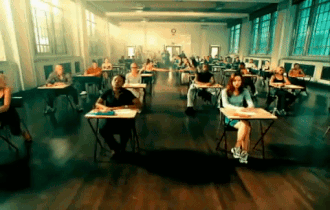
That’s not to imply Five’s journey to this point hadn’t been well managed. Indeed, with a #1 album and three consecutive top ten singles under their belt, things were going very well. But Everybody Get Up felt like a watershed moment where all the pieces fell into place, and Five found their style. Their debut album was co-produced by the late Denniz PoP, who – as one of the founders of Cheiron Studios – had recruited Max Martin and a slew of other vital songwriters and producers. This was a guy who knew his stuff when it came to pop music, and that is probably why the first few Five singles had a distinctly Americanised sound and image. But something shifted with Everybody Get Up, and the song instead had a much harder, raucous, pop-rock sound.

The track is still packed with a slew of American references, and fairly niche ones at that, considering Five’s target audience. Not that a mention of a #19 Janet Jackson hit from 1986 would be lost on everyone, but: “Keep the beat nasty, like Janet my reaction” doesn’t jump out as a lyric that will provoke immediate recognition. Even the thumping guitar riff – affectionately borrowed from Joan Jett’s I Love Rock ‘n Roll – would presumably be more recognisable to an American audience where the song was a much bigger hit. In itself, none of this is an issue, and Five, indeed, weren’t the first – or last – group to do it. Curiously, despite all the above elements, there is something about Everybody Get Up that sounds quintessentially and unmistakably British.
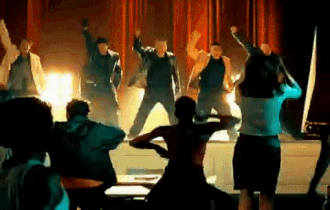
And that is why the single worked so well. This was Five doing something that no other pop group was doing in the same way. The rock elements incorporated into the work of Cheiron were much more stylised and squelchy, while, by comparison, this feels rough and ready. That’s more a reflection of the performance, not the production. It’s loud, chaotic, and intimidatingly aggressive (by pop music standards, at least). Everybody Get Up positioned Five as rebellious bad boys, albeit in a strictly masterminded and largely sanitised way that ensured such deviance would continue to be commercially marketable.
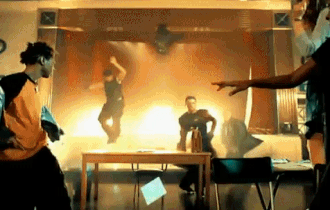
Between the spikily delivered rap verses – peppered with guttural screams – lies the one thing consistent in Five’s career: their penchant for a “hear it once, remember it forever” chorus. It’s brilliantly effective; the sort that lends itself perfectly to school discos (or maybe drunken nights out) and live gigs. It doesn’t matter where, you know that someone is always going to enthusiastically throw themselves into J’s “Baby bring it on, bring it on now” chant.
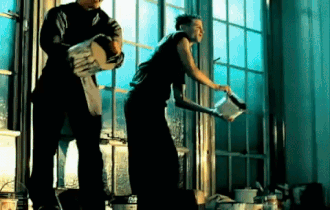
Amidst such splendid chaos, there is one notably brilliant moment in ‘90s pop music. It comes as Everybody Get Up is lurching towards what seems must be its final chorus – with 30 seconds left on the clock – and having just dropped a third full verse (no middle-eights here), there isn’t a lot of time for any (literal) last-minute surprises. Then, the production loses everything but the beat as the chorus swaggers coolly towards a drop: “Ah get on down…AH!” *CRASH* and then reaches the climax of the song for the remaining 23 seconds. It’s an incredibly effective, utterly essential moment in the rich tapestry of pop music.

The visual for Everybody Get Up was a similarly simple yet effective affair. It sees Five render themselves completely unemployable within the academic profession as they crash an exam hall to perform the song. However, they are enabled somewhat by a rather inept invigilator, who – after starting the exam – tells everyone he’ll be back in ‘five minutes’, which is basically an invitation for chaos. He does, however, make a very of-its-time request that the students: ‘Please turn off all pagers and mobiles’. Ultimately, though, that’s the least of his concerns because as soon as he leaves the room, in strut Five as the song kicks off.

It’s not entirely clear why the exam hall has so many containers of paint within the vicinity (or why there’s a fully functional spotlight system), but Five are soon tossing it over the rioting crowd. By this point, it’s hardly surprising that one of the students is carrying a lighter and activates the sprinkler system(!). It might not be a glowing representation of the UK school system, but the video positions Five exceptionally well as the masters of madness – a rebellious troupe leading a chaotic revolution – and, conveniently, the only ones that remain clean and dry. But there are some boyband conventions even they couldn’t wholly abandon, and Everybody Get Up includes a dance routine that practically choreographs itself. Like the chorus, it’s not about complexity; it’s all about the quickest way to ensure the single embeds itself in your brain and body.
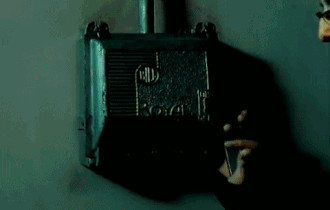
Everybody Get Up peaked at #2 in the UK; although not the biggest-selling single from the album, it certainly became one of the most visible and enduring. This felt like a moment when Five’s identity and purpose became crystal clear, which is slightly ironic considering their success in America at the same time might well have been pulling the group in a somewhat different direction. Everybody Get Up showcases Five at their best: imaginative lyrics, memorable hooks and an irrepressible performance.



